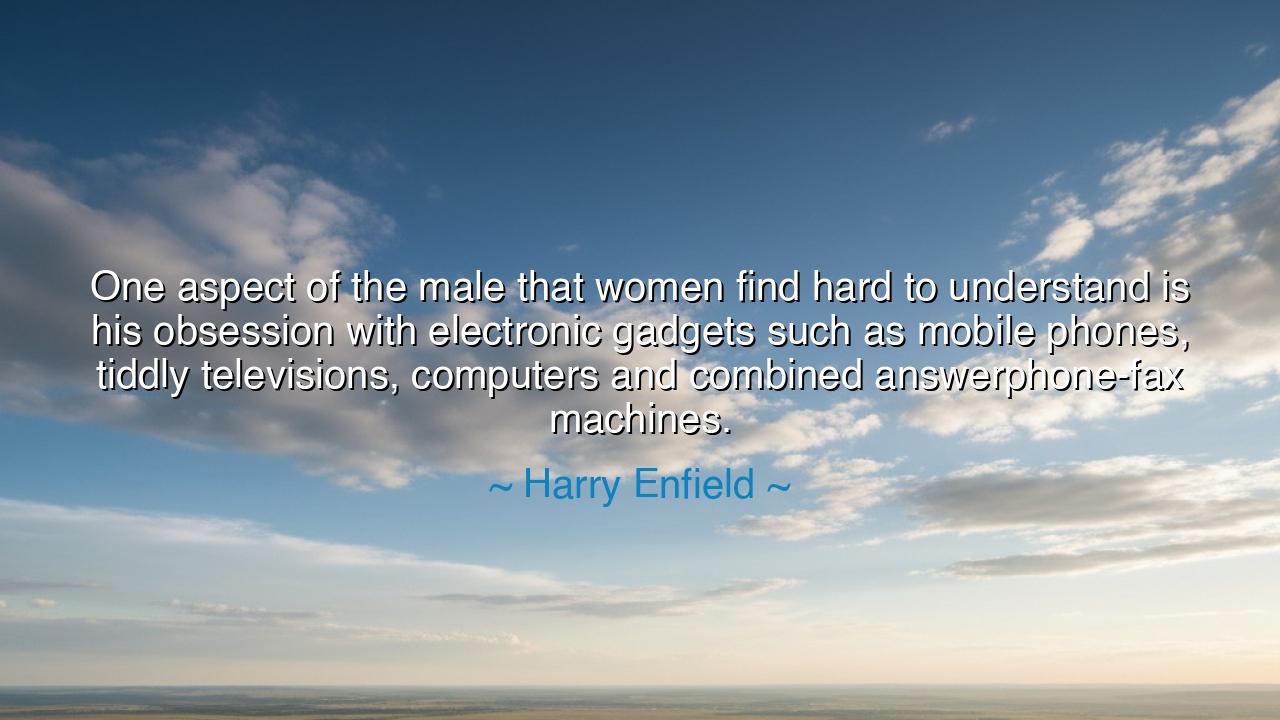
One aspect of the male that women find hard to understand is his
One aspect of the male that women find hard to understand is his obsession with electronic gadgets such as mobile phones, tiddly televisions, computers and combined answerphone-fax machines.






In the distant past, when the world was young and the first humans walked the earth, their desires were simple, yet profound. They sought survival, knowledge, and companionship. As time passed, the human spirit—particularly the male spirit—found itself drawn to the creation and manipulation of tools, driven by an inherent need to control the world around him. The gadgets and machines that we see today—those that have become so intricately woven into the fabric of modern life—are the culmination of this ancient drive. Harry Enfield, in his humorous and insightful reflection, speaks of an aspect of the male nature that has bewildered many, especially women: "One aspect of the male that women find hard to understand is his obsession with electronic gadgets such as mobile phones, tiddly televisions, computers and combined answerphone-fax machines."
At the heart of Enfield’s quote lies a deep observation about the male psyche, and the obsession with technology that many find perplexing. It is as though men, driven by an almost primal urge, seek to master the world through the devices they create. From the beginning of time, men have been builders, innovators, and adventurers, carving out a space for themselves in the world through their ability to create tools that extend their power. The gadgets Enfield refers to—the mobile phone, the computer, the television—are merely the modern descendants of the spear, the plow, and the wheel. These devices are no longer just tools for survival, but symbols of the male desire to command and influence his environment.
Consider the great engineers of ancient civilizations—Archimedes, Daedalus, and Leonardo da Vinci—who were not merely concerned with creating devices for convenience, but with understanding and mastering the forces of nature. Da Vinci’s sketches, filled with intricate designs for machines that could fly, or move water, or serve as weapons of war, reflect a deep, unyielding obsession with control and innovation. This drive has not diminished over the centuries; it has only evolved. The modern gadgets that men cling to, from the small screen of a mobile phone to the whirring machinery of computers, are simply reflections of this ancient urge.
Yet, in the female gaze, these same gadgets seem mysterious, sometimes senseless. While men may see these machines as tools of empowerment, women may view them as distractions—things that serve no greater purpose than to occupy time, attention, and space. Women, often more attuned to the relational and emotional aspects of life, may find it difficult to understand why a man might become so consumed by the allure of a new gadget, and yet this obsession is rooted in an ancient yearning—the desire to conquer, to possess, to bend the world to one’s will.
In the modern era, the computer, once the exclusive domain of the elite, has become a tool of everyday life. It allows us to reach across oceans, connect with strangers, and access a vast storehouse of knowledge. Yet, men’s obsession with these machines, especially in the form of gadgets like the mobile phone or the answerphone-fax machine, often reflects something deeper than mere convenience. These devices symbolize a quest for control over time, information, and communication. As Enfield humorously points out, they are seen not as mere conveniences, but as extensions of self, allowing the user to connect, to dominate the flow of information, and to command attention.
This obsession is not without its consequences, however. Just as the ancients once became consumed by the gods, forgetting their duties and relationships in pursuit of power, so too can modern men become ensnared in their gadgets, losing sight of the greater picture. The lesson here is clear: while innovation and mastery over the world are noble pursuits, they must not come at the expense of the very relationships and experiences that make life truly meaningful. The tools we create—whether in ancient times or modern—should serve humanity, not replace it.
Thus, the practical action is to find balance. Men must embrace their love for technology, but not let it consume them. Women, too, should seek to understand the deeper drive behind these obsessions, and work with their partners to channel them into meaningful connections and shared experiences. Like the ancient creators, we are called not just to build and control, but to understand and connect. The gadgets we create, and the devices we use, must not be allowed to overshadow the bonds that tie us together. In the end, it is not the gadgets themselves that define us, but how we use them to connect to each other and to the world around us.






AAdministratorAdministrator
Welcome, honored guests. Please leave a comment, we will respond soon